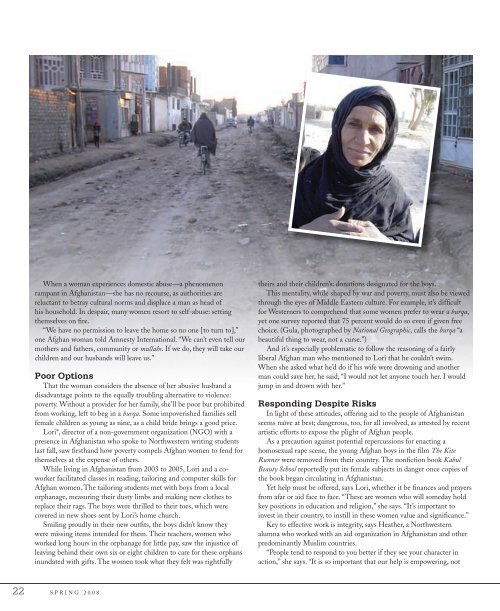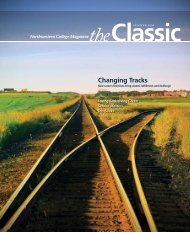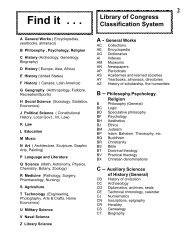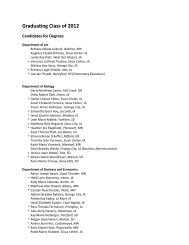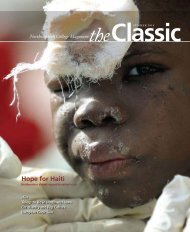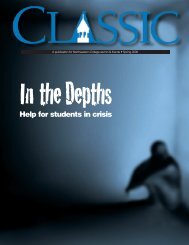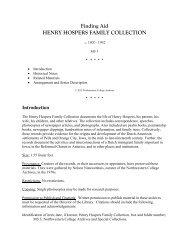Spring 2008 - Northwestern College
Spring 2008 - Northwestern College
Spring 2008 - Northwestern College
Create successful ePaper yourself
Turn your PDF publications into a flip-book with our unique Google optimized e-Paper software.
When a woman experiences domestic abuse—a phenomenon<br />
rampant in Afghanistan—she has no recourse, as authorities are<br />
reluctant to betray cultural norms and displace a man as head of<br />
his household. In despair, many women resort to self-abuse: setting<br />
themselves on fire.<br />
“We have no permission to leave the home so no one [to turn to],”<br />
one Afghan woman told Amnesty International. “We can’t even tell our<br />
mothers and fathers, community or mullahs. If we do, they will take our<br />
children and our husbands will leave us.”<br />
Poor Options<br />
That the woman considers the absence of her abusive husband a<br />
disadvantage points to the equally troubling alternative to violence:<br />
poverty. Without a provider for her family, she’ll be poor but prohibited<br />
from working, left to beg in a burqa. Some impoverished families sell<br />
female children as young as nine, as a child bride brings a good price.<br />
Lori*, director of a non-government organization (NGO) with a<br />
presence in Afghanistan who spoke to <strong>Northwestern</strong> writing students<br />
last fall, saw firsthand how poverty compels Afghan women to fend for<br />
themselves at the expense of others.<br />
While living in Afghanistan from 2003 to 2005, Lori and a coworker<br />
facilitated classes in reading, tailoring and computer skills for<br />
Afghan women. The tailoring students met with boys from a local<br />
orphanage, measuring their dusty limbs and making new clothes to<br />
replace their rags. The boys were thrilled to their toes, which were<br />
covered in new shoes sent by Lori’s home church.<br />
Smiling proudly in their new outfits, the boys didn’t know they<br />
were missing items intended for them. Their teachers, women who<br />
worked long hours in the orphanage for little pay, saw the injustice of<br />
leaving behind their own six or eight children to care for these orphans<br />
inundated with gifts. The women took what they felt was rightfully<br />
theirs and their children’s: donations designated for the boys.<br />
This mentality, while shaped by war and poverty, must also be viewed<br />
through the eyes of Middle Eastern culture. For example, it’s difficult<br />
for Westerners to comprehend that some women prefer to wear a burqa,<br />
yet one survey reported that 75 percent would do so even if given free<br />
choice. (Gula, photographed by National Geographic, calls the burqa “a<br />
beautiful thing to wear, not a curse.”)<br />
And it’s especially problematic to follow the reasoning of a fairly<br />
liberal Afghan man who mentioned to Lori that he couldn’t swim.<br />
When she asked what he’d do if his wife were drowning and another<br />
man could save her, he said, “I would not let anyone touch her. I would<br />
jump in and drown with her.”<br />
Responding Despite Risks<br />
In light of these attitudes, offering aid to the people of Afghanistan<br />
seems naïve at best; dangerous, too, for all involved, as attested by recent<br />
artistic efforts to expose the plight of Afghan people.<br />
As a precaution against potential repercussions for enacting a<br />
homosexual rape scene, the young Afghan boys in the film The Kite<br />
Runner were removed from their country. The nonfiction book Kabul<br />
Beauty School reportedly put its female subjects in danger once copies of<br />
the book began circulating in Afghanistan.<br />
Yet help must be offered, says Lori, whether it be finances and prayers<br />
from afar or aid face to face. “These are women who will someday hold<br />
key positions in education and religion,” she says. “It’s important to<br />
invest in their country, to instill in these women value and significance.”<br />
Key to effective work is integrity, says Heather, a <strong>Northwestern</strong><br />
alumna who worked with an aid organization in Afghanistan and other<br />
predominantly Muslim countries.<br />
“People tend to respond to you better if they see your character in<br />
action,” she says. “It is so important that our help is empowering, not<br />
22<br />
S P R I N G 2 0 0 8


